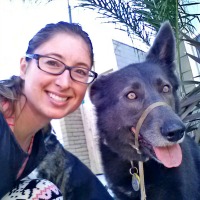“Dog Socializing” is a major buzzword with dog trainers, dog walkers, and dog owners. We all want basically the same thing: polite, calm, dogs that we can walk and take to dog parks and dog friendly beaches without fear of having to leave in shame after a high speed chase, flip flops and poo bags flying, screaming “PRECIOUS!! NO, PRECIOUS!!” ...Trust me on that one.
What Is Dog Socializing?
Socializing is an important part of dog training that generally means training your dog to be comfortable, behave appropriately, and basically not be a douche in social situations. Socializing also means that you, as your dog’s human, learn and understand your dog’s personality and know what types of situations, people, and dogs are good and bad for her. Think about it – even a social butterfly, has places they’d rather not go to (The dentist? Jury duty? An alcohol free baby shower?) and some people they just don’t like (The dental hygienist. Stank-ass juror #6. The misery-loves-company mom-to-be. Etc.) Dogs have their comfort bubble too. Socialization does not mean forcing your dog into situations and expecting her to feel comfortable, but you gotta try. Do it for your dog. And if not for your dog, do it for vanity your instagram feed:

How Do I Socialize My Puppy?
- Puppies will naturally start socializing with their mother and litter mates almost immediately. This is where they learn pack structure and rules of play. The momma dog usually has no problem putting her puppies in check, and handles necessary corrections. So unless you think something is wrong, just let the puppies figure out what’s okay and what’s not.
- If you’re lucky, you can start socializing and associating positive feelings with new experiences when your puppy is brand spankin' new, and most receptive to them, sometime around three to twelve weeks. Consider avoiding your puppy's exposure to public spaces until they’ve finished their vaccinations. Parvo ain't fun. BUT!! That being said, most dogs are at a greater risk of abandonment and euthanasia for behavior problems than communicable diseases, so don’t let fear of diseases prevent you from socializing your puppy! Focus on places you trust to be clean and disease free, and keep a close eye on her (duh). Let your puppy loose at friends houses and yards, or on freshly cleaned floors and patios.
- As your puppy gets a little older, you can start exposing her to new situations outside and in public – busy streets, crowds of children (luckily my dog tolerates children a lot better than I do), any experiences you expect she’ll have to encounter throughout her life. Use lots of praise and positive reinforcement when your puppy reacts with curiosity and excitement to keep the good vibes going. As she grows up, you'll want to curb her enthusiasm if she gets hyper, but for puppies, we just want them to associate a positive feeling with these new experiences. But stay aware of her body language – if she’s cowering, scared, or acting overwhelmed, try to “tone down” the situation. If you can't, say Bye Felisha and get the hell on.
Socialization should not be a negative experience. If this happens, then next time, try something less intense and build gradually – like if you had your puppy in a room full of new people and she wasn't thrilled, try a room with just two or three new people. Once she’s comfortable with that, gradually bring her to places with bigger and bigger crowds. Go as slowly as she needs to to make sure she stays comfy.
Respect Your Puppy’s Personality
It’s amazing to watch your dog’s unique personality develop as they grow up. Our dog trainer, Lindsey, likes to remind me that there’s no one “perfect training technique” because every dog is different. So it’s extremely important to “train yourself” as a dog owner while you socialize your puppy: if you start to notice there are situations she just does not like, or other dogs she doesn’t get along with… it's your job to try to avoid those! You understand the need for dental exams, but your dog won’t understand things like that – she’ll just know she’s in a “bad” environment and will stress out. Your job isn’t to force your puppy to be happy and comfortable in every single situation, it’s to understand her unique comfort zone, and manage her environment as best you can.
Have you ever socialized a puppy? Leave a comment and let me know what worked for you. Obviously, Doggie Joggie values socialization, and the earlier you do it, the easier it is. If you've got a new puppy or rescue dog (good for you!!), or you think your pooch has socialization issues, feel free to contact us with any questions!
And stay tuned for Part 2 -- Socializing Adult Dogs!
ABOUT ALI MEZA

Hi, I'm Ali, co-founder of Doggie Joggie, a pet care company in San Diego specializing in dog running, dog walking, dog training, and pet sitting. My official title is "Director of Happiness", and my favorite parts of my job are talking too much, discovering new parts of San Diego on foot, and kissing dogs on the mouth. Connect with Doggie Joggie on Instagram or Google+ and stay in touch!